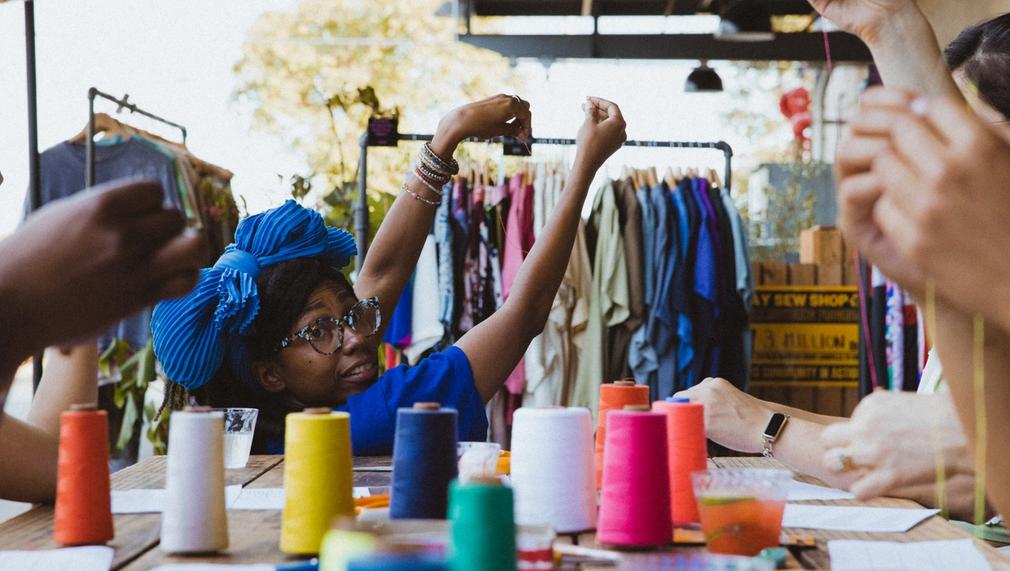THREADING CHANGE: THE REPAIR LAB
Imagine a world without textile waste. The Center for Reuse + Repair and SUAY are making it happen. Through THE REPAIR LAB, we will create a community space to address post-consumer textile waste, empowering Angelenos to repair, dye, remake, and connect. Together, we will transform Los Angeles, fostering a sustainable and equitable ecosystem as part of our daily lives.

What is the primary issue area that your application will impact?
Social support networks
In what stage of innovation is this project, program, or initiative?
Pilot or new project, program, or initiative (testing or implementing a new idea)
What is your understanding of the issue that you are seeking to address?
The fashion industry's practices could consume over 26% of the carbon budget for a 2°C global warming limit by 2050, making a shift from wasteful systems essential. Despite production nearly doubling in 15 years due to sales, clothing use has dropped by nearly 40%. Circular fashion faces significant barriers:
Accessibility: Repairing textiles is expensive, making fast fashion more appealing. Tailoring costs $10-$250, while fast fashion items, like those on SHEIN, average $28.51 in 2024.
Lack of Skill: 59% of consumers would repair garments if they knew how.
Lack of Community: Existing recycling methods lack local, accessible, and community-focused options, limiting sustainable fashion's reach.
Describe the project, program, or initiative this grant will support to address the issue.
Imagine a pottery studio - equipped with tools, offering classes, fostering a collaborative community, and empowering individuals with valuable skills. Now, apply this model to garment repair and reuse. This is what The Repair Lab is: A transformative space dedicated to reducing the environmental footprint of the fashion industry while equipping Angelenos with invaluable skills. At The Repair Lab, participants will learn to mend, alter, and creatively problem-solve using sewing equipment through our hands-on workshops, teaching both basic and advanced repair techniques.
Our community events, such as clothing swaps and DIY mending sessions, will foster empowerment, bringing textile repair and reuse into individuals' hands within a supportive and creative environment. By collaborating with local schools, organizations, and businesses, we aim to spread awareness about the environmental impact of textile waste and the benefits of garment repair, encouraging a broader culture of sustainability.
Design workshops will focus on innovative upcycling methods, transforming textiles that would otherwise end up in landfills. With an open studio model, we offer low/no-cost access to repair equipment, skill sharing, and a restorative community space. The Repair Lab seeks to create a replicable model for sustainability in the garment industry, seamlessly aligning equity with environmental stewardship.
Describe how Los Angeles County will be different if your work is successful.
If our work is successful, Los Angeles County will transform into a dynamic epicenter of sustainable fashion and community empowerment. Over the one-year grant period from October 2024 to October 2025, we aim to build a foundational network of workshops, events, and educational outreach programs that will ignite a cultural shift toward repair and reuse. Through direct engagement, we will educate thousands about the environmental impact of textile waste and provide the tools and skills necessary for garment repair. Our immediate goal is to establish The Lab as a thriving hub where innovation and community coalesce. In the long term, we envision scaling this model beyond the boundaries of Los Angeles County, creating a blueprint for sustainable living that other cities can replicate. The Repair Lab will serve as a prototype, demonstrating how local efforts can have a broader impact, fostering a sense of hope and mental well-being through community-driven and belonging initiatives.
What evidence do you have that this project, program, or initiative is or will be successful, and how will you define and measure success?
Currently, The Repair Lab hosts mending classes and open studio groups focused on hand-sewing. We've also engaged in educational outreach, with schools hosting workshops and students touring our headquarters. There's a strong desire for these skills, evidenced by requests for advanced machinery repairs, higher-skill classes, and more school visits. Over the past year, we've hosted 16 events, reaching about 360 people and repairing 400 pounds of textiles. Despite these beginnings, our program lacks a formal structure. This funding will establish a permanent space with advanced machinery, quadrupling workshops, participants, and textiles repaired. We'll measure success through participant feedback and community surveys, transforming The Repair Lab into a structured movement that promotes sustainable living and can be replicated in other communities.
Describe the role of collaborating organizations on this project.
SUAY will serve as the cornerstone of The Repair Lab, bringing its extensive expertise in sustainable practices and community engagement to the forefront. As a pioneering organization in textile recycling, SUAY will lead the charge in developing innovative curriculum centered on fabric repair and upcycling. Their dedicated team will facilitate hands-on workshops, mentoring participants in the art of mending and creative reuse. Moreover, SUAY will collaborate closely with local makers and educational partners to create a vibrant, inclusive learning environment that empowers individuals to embrace sustainability in their everyday lives.”
Approximately how many people will be impacted by this project, program, or initiative?
Direct Impact: 1,300.0
Indirect Impact: 10,000.0